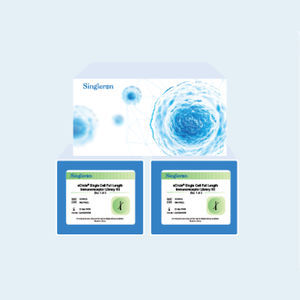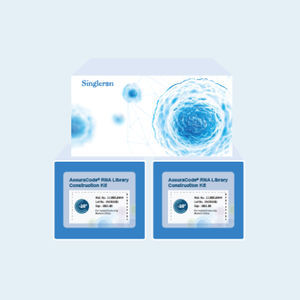
- Laboratory
- Laboratory medicine
- Solution reagent
- Singleron Biotechnologies
Solution reagent kit ProMoSCOPE™tissueproteinenzymatic
Add to favorites
Compare this product
Characteristics
- Type
- solution
- Applications
- tissue
- Tested parameter
- protein
- Method
- enzymatic
Description
Glycosylation is an enzymatic process in which carbohydrate groups are attached to the protein or lipids’ backbone. Protein glycosylation is one of the most common post-translational modifications and can be seen in all living organisms. It influences processes such as protein folding, stability and membrane organization. ProMoSCOPE™ Single Cell Glycosylation Detection Kits enable accurate quantification of cell surface glycosylation level together with gene expression profiles in single cell level simultaneously. It is achieved by chemoenzymatic method where ProMoSCOPE tag covalently binds to N-Acetyllactosamine (LacNAc) at cell surface. The level of glycosylation together with whole transcriptome information can be used for in-depth analysis of cell status and functions in complex biological systems.
ProMoSCOPE™ Single Cell Glycosylation Detection Kit uses the SCOPE-chip®, a portable, microfluidic chip with microwells that integrates multiple steps of the processing workflow such as single-cell capture, cell lysis and capture of cellular mRNA. Sequencing ready libraries can be prepared with the reagents included. The SCOPE-chip® is easy to use and can be operated manually without special equipment. It is suitable for cells from a large variety of tissue types.
Thymus from mice are extracted and both labeled and unlabeled single cell suspensions are loaded to SCOPE-chip® and processed by ProMoSCOPE™ Single Cell Glycosylation Detection Kit. Cells are annotated in the UMAP plot and shown in (A). UMAP plot colored by treatment is shown in (B).
Catalogs
No catalogs are available for this product.
See all of Singleron Biotechnologies‘s catalogsRelated Searches
- Solution reagent kit
- Molecular biology reagent kit
- Research reagent kit
- Protein reagent kit
- Diagnostic reagent kit
- Enzyme reagent kit
- Histology reagent kit
- Microbiology reagent kit
- Tissue reagent kit
- NGS reagent kit
- Gene reagent kit
- Enzymatic reagent kit
- Animal-based reagent kit
- Fungi reagent kit
- Pathology reagent
- Mutation detection reagent kit
- RNA Synthesis reagent kit
- Drug reagent
- Yeast reagent kit
*Prices are pre-tax. They exclude delivery charges and customs duties and do not include additional charges for installation or activation options. Prices are indicative only and may vary by country, with changes to the cost of raw materials and exchange rates.











